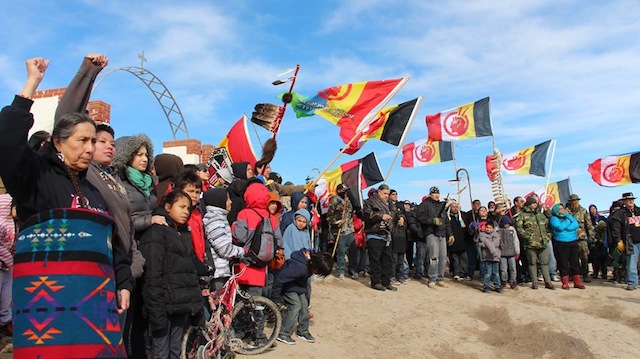
Calgary-based TC Energy Corporation (formerly TransCanada) confirmed June 9 that it has terminated the Keystone XL Pipeline Project. Construction on the project, a partnership with the Alberta provincial government, was suspended following the revocation of its US presidential permit on Jan. 20. The company said in a statement that it will “continue to coordinate with regulators, stakeholders and Indigenous groups to meet its environmental and regulatory commitments and ensure a safe termination of and exit from the Project.”
The pipeline, which was to transport tar sands oil from western Canada to a hub at Steele City, Nebraska, has been a critical concern in the fight against climate change. It has been especially opposed by Native American peoples whose lands lie along the project’s path. Dallas Goldtooth (Mdewakanton Dakota) of the Indigenous Environmental Network reacted to the announcement on Twitter: “We took on a multi-billion dollar corporation and we won!!” (Indian Country Today)
The original Keystone pipeline, which went on line in 2010, brings oil from the tar sands fields of Alberta to the Steele City hub. Keystone XL was intended to both to provide a secondary route from Alberta and to extend the pipeline to the Gulf Coast. The Gulf Coast extension has already been completed, running between Cushing, Oklahoma, and Port Arthur, Texas. It opened in 2014, with a link connecting the hubs at Cushing and Steele City. The now cancelled secondary route from Hardisty, Alberta, to Steele City would have pumped 830,000 barrels of tar sands oil per day to refineries on the Gulf Coast of Texas. (NRDC)
Currently, Canada exports about 3.8 million barrels of crude (mostly tar sands oil) per day to the United States, according to US Energy Department data. Analysts expect that to rise to between 4.2 million and 4.4 million barrels per day over the next few years. Pipeline expansions already currently in progress will add more than 950,000 bpd of export capacity for Canadian producers before 2025. (Reuters, Jan. 22) In 2004, Canada surpassed Saudi Arabia as the largest single exporter of oil to the United States, providing 1.6 million barrels per day compared to the Saudi’s 1.5 million barrels. (Council on Foreign Relations)
And with the hydrocarbon industry recovering from the pandemic-induced paralysis, US domestic shale oil output is expected to climb by 26,000 barrels per day in June to 7.73 million bpd. (Reuters, May 17)
Photo of Lakota protest against Keystone pipeline: Victor Puertas/Deep Roots United Front via Intercontinental Cry





Spills continue on Keystone pipeline
The completed leg of the Keystone pipeline remins closed after the spill of some 14,000 barrels of crude lastb week in Washington County, Kansas—the largest spill since the line opened in 2010. The Keystone has now leaked more oil than any other pipeline in the US, qith more than 26,000 barrels of crude oil spilled in the last 12 years. (Reuters, CBS News, The Hill, Bloomberg)
Spills continue on Keystone pipeline
The nearly 2,700-mile Keystone oil pipeline was shut down April 8 after it ruptured in North Dakota, halting the flow of millions of gallons of crude oil from Canada to refineries in the U.S. and potentially leading to higher gasoline prices.
South Bow, a liquid pipeline business that manages the pipeline, said it shut down the pipeline after control center leak detection systems detected a pressure drop in the system. The spill is confined to an agricultural field about 60 miles southwest of Fargo. (NBC)